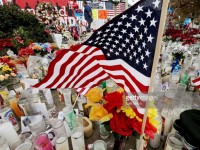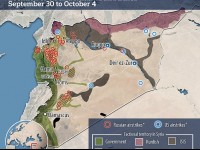
Wang Zhen, Professor and Deputy Director, Institute for International Relation Studies, Shanghai Academy of Social Sciences
Jan 12, 2016
Having incubated the Daesh in its global war on terror, the US must take the responsibility to destroy it. Washington cannot sit back and expect the international community to defeat the Daesh forces without US leadership.
Yu Sui, Professor, China Center for Contemporary World Studies
Jan 06, 2016
While Moscow-Ankara tensions are in the short-term spotlight, a different bilateral relationship will shape the outcome of Middle East conflicts. Should the militaries of Russia and US cooperate fully, the complete collapse of ISIS could be expected soon, as Russia’s foreign minister recently noted. Such a truly united front in the war on terrorism would be a gratifying achievement on the world stage.
Wu Sike, Member on Foreign Affairs Committee, CPPCC
Dec 28, 2015
Effective cooperation among all nations to throttle terrorists’ means of fund-raising – particularly oil deals -- is urgently needed in the global war against terrorism. But that short-term goal must be followed by a long-term objective: stability in the Mideast region.

Shen Dingli, Professor, Institute of International Studies, Fudan University
Dec 23, 2015
Presently, public sentiment to minimize the risk of terror is on the rise, one of the factors prompting the US to reassess its strategic goals in the Middle East. The result is a more united front in the war against terrorism.
Wu Zurong, Research Fellow, China Foundation for Int'l Studies
Dec 04, 2015
The global community needs the participation of countries where the IS and other terror groups have made their bases, with the help and backing of the broad masses of Muslim people in the region. Outside force has proven to be inadequate to eliminate the violence and the root causes behind it, and serious nation-building is required.
Jin Liangxiang, Senior Research Fellow, Shanghai Institute of Int'l Studies
Nov 27, 2015
While outside interference in Middle Eastern affairs has done nothing to improve the employment situation, build strong and efficient political structure, and prompt a solid union against terrorism, a kind of regional security structure including major regional powers and external powers is urgently needed. In this regard, the U.S. can do a lot, and China’s Belt and Road Initiative should be another opportunity for a fresh approach.

Fu Xiaoqiang, Vice President, China Institutes of Contemporary International Relations
Nov 25, 2015
The U.S. must shoulder the responsibility of uniting the civilized world against terrorists and extremists, leading an effort to set aside differences among allies so that they can focus on a whole-hearted effort to eliminate this global threat.
Nov 19, 2015
Chinese President Xi Jinping on Thursday strongly condemned the Islamic State (IS) group for killing a Chinese national and expressed his deep sympathy to the victim's family.
Chen Jimin, Guest Researcher, Center for Peace and Development Studies, China Association for International Friendly Contact
Nov 19, 2015
There must be a fundamental policy shift embraced by all countries to eliminate the breeding ground of terrorism and violent extremism. Eradicating poverty, achieving balanced global development, strengthening the effectiveness and inclusiveness of global governance mechanisms, and showing respect for the rights of peoples to choose the development road are the essential policy objectives.
Dan Steinbock, Founder, Difference Group
Nov 09, 2015
Syria’s disintegration exemplifies the eclipse of U.S.-sponsored regime changes, whereas Chinese policy holds the promise of economic development. But time for a global solution is running out.
Back to Top

- China-US Focus builds trust and understanding between the U.S. and China through open dialogue among thought leaders.
- Our Offerings
- Topics
- Videos
- Podcasts
- Columnists
- Research Reports
- Focus Digest
- Stay Connected
-
Thanks for signing up!
- Get the latest stories from China-US Focus weekly.